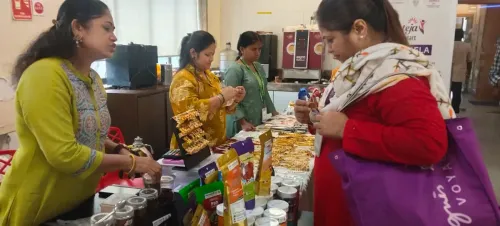Is Dukhtareen-e-Taiba the Next Challenge as ISI Changes Tactics?

Synopsis
Key Takeaways
- Dukhtareen-e-Taiba is the revived women's wing of Lashkar-e-Taiba.
- Focus is on recruitment and radicalization, not direct attacks.
- Reports indicate ongoing recruitments in Pakistan.
- Women are seen as effective for infiltrating and radicalizing society.
- ISI's strategy includes merging DeT with other women-centric groups.
New Delhi, Oct 11 (NationPress) A group currently under close surveillance by intelligence agencies is the Dukhtareen-e-Taiba (DeT), the women's faction of Lashkar-e-Taiba (LeT), which has been in development for several years. Initially, the LeT aimed to establish the DeT to cultivate female suicide bombers, but this initiative was ultimately abandoned.
Now, the LeT is revitalizing its women's division. However, the objective has shifted from conducting attacks to focusing on recruitment and radicalization.
Reports from the Intelligence Bureau indicate that recruitment efforts are underway in Pakistan, with the current strength of the group estimated at around 25 members, and plans to incorporate an additional 25 in the initial phase. The LeT is keen to ensure that DeT members do not participate in direct terrorist activities.
The primary role of these women is to identify and radicalize women in India. After their radicalization, attempts will be made to send them to Pakistan briefly for training.
The LeT is also engaging its local networks to scout and instruct women. While some may focus on radicalizing and recruiting, those who complete their training could potentially become suicide bombers in the long term. The ISI is continuously reassessing its strategies to confront the Indian state.
In the aftermath of Operation Sindoor, which dismantled terrorist camps and infrastructure, the ISI has been aiding groups such as the LeT and Jaish-e-Mohammad in regrouping.
Aside from the DeT, the ISI has also reactivated two other women-centric terror factions: Duktharam-e-Millat (DeM) and Daur-e-Sofa (DeS). Both of these groups operate under direct ISI oversight, and there are plans to merge them with the DeT. The DeS is equipped with dedicated training camps in Pakistan, while the DeM focuses on scouting, radicalization, and recruitment.
When asked about the potential effectiveness of these women-centric terror groups, Indian agencies are proceeding with caution. These groups are unlikely to operate in the same manner as their male counterparts, avoiding aggression and gunfights typical of groups like LeT or Jaish-e-Mohammad.
The strategy for these groups is to gradually infiltrate society and engage in extensive radicalization. Women have demonstrated a greater capacity for brainwashing, as they tend to be more patient and willing to invest time in ensnaring their targets, similar to the effectiveness of female spies in various countries.
Numerous terror organizations have attempted to establish all-female factions. The Indian Mujahideen once had a group named Shaheen Force, but it failed to gain traction. Similar groups under LeT and Jaish-e-Mohammad are still in their infancy, despite concepts being proposed since 2008.
The majority of women who were recruited and trained were never permitted to execute terror operations, often being assigned to moral policing until further directives were issued. Male members expressed discontent over their responsibilities being delegated to women, resulting in resistance.
However, in light of India's firm response following the Pahalgam attack, the ISI and terrorist organizations have been compelled to alter their strategies. With all-male terror factions under scrutiny from Indian agencies, their operational capabilities have diminished, prompting the ISI to pivot towards deploying female forces in India.
Despite previous setbacks, Indian agencies are remaining vigilant against these new formations. A notable example of a successful women's group can be seen in Burdwan.
The Jamaat-ul-Mujahideen Bangladesh (JMB) stands out as the only regional terror group to have successfully cultivated a women's faction. They appointed a woman named Fatima to lead this group, who then managed to recruit women that went on to create explosives in Burdwan in 2014. Fatima was notably the spouse of Sajid, the mastermind behind the Burdwan module.









